大学英语读写教程
- 格式:ppt
- 大小:2.10 MB
- 文档页数:5
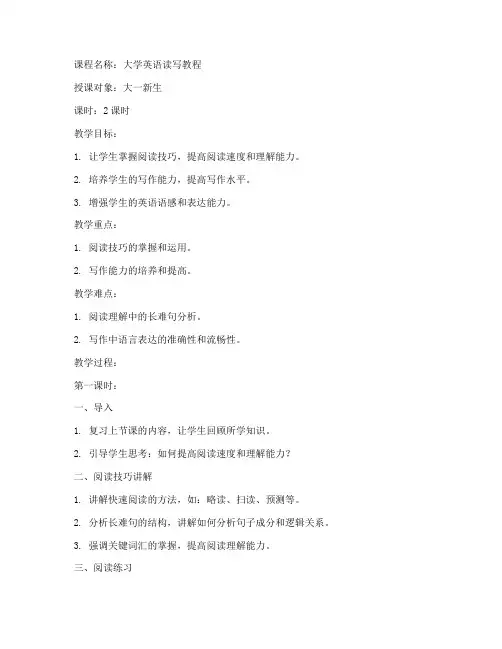
课程名称:大学英语读写教程授课对象:大一新生课时:2课时教学目标:1. 让学生掌握阅读技巧,提高阅读速度和理解能力。
2. 培养学生的写作能力,提高写作水平。
3. 增强学生的英语语感和表达能力。
教学重点:1. 阅读技巧的掌握和运用。
2. 写作能力的培养和提高。
教学难点:1. 阅读理解中的长难句分析。
2. 写作中语言表达的准确性和流畅性。
教学过程:第一课时:一、导入1. 复习上节课的内容,让学生回顾所学知识。
2. 引导学生思考:如何提高阅读速度和理解能力?二、阅读技巧讲解1. 讲解快速阅读的方法,如:略读、扫读、预测等。
2. 分析长难句的结构,讲解如何分析句子成分和逻辑关系。
3. 强调关键词汇的掌握,提高阅读理解能力。
三、阅读练习1. 分组讨论,让学生在小组内进行阅读练习。
2. 针对练习中的问题进行讲解和解答。
四、课堂小结1. 总结本节课所学内容,强调阅读技巧的重要性。
2. 布置课后阅读任务,让学生巩固所学知识。
第二课时:一、导入1. 回顾上节课的内容,让学生谈谈自己的阅读体会。
2. 引导学生思考:如何提高写作水平?二、写作技巧讲解1. 讲解写作的基本结构,如:引言、正文、结论等。
2. 分析写作中的常见错误,如:语法错误、逻辑错误等。
3. 强调语言表达的准确性和流畅性。
三、写作练习1. 分组讨论,让学生在小组内进行写作练习。
2. 针对练习中的问题进行讲解和解答。
四、课堂小结1. 总结本节课所学内容,强调写作技巧的重要性。
2. 布置课后写作任务,让学生巩固所学知识。
教学评价:1. 课堂参与度:观察学生在课堂上的表现,了解他们对阅读和写作的兴趣和积极性。
2. 课后作业完成情况:检查学生的课后阅读和写作任务完成情况,了解他们的学习效果。
3. 课堂提问回答情况:通过提问了解学生对所学知识的掌握程度。
教学反思:1. 根据学生的学习情况和课堂反馈,调整教学策略和方法。
2. 关注学生的个体差异,因材施教,提高教学效果。
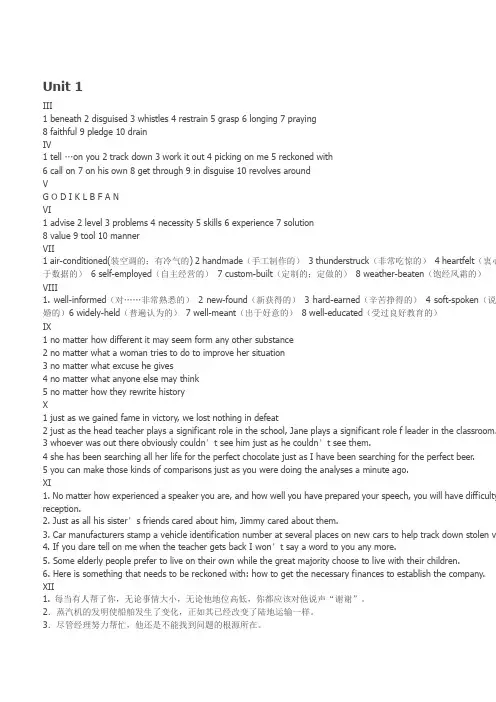
Unit 1III1 beneath2 disguised3 whistles4 restrain5 grasp6 longing7 praying8 faithful 9 pledge 10 drainIV1 tell …on you2 track down3 work it out4 picking on me5 reckoned with6 call on7 on his own8 get through9 in disguise 10 revolves aroundVG O D I K L B F A NVI1 advise2 level3 problems4 necessity5 skills6 experience7 solution8 value 9 tool 10 mannerVII1 air-conditioned(装空调的;有冷气的)2 handmade(手工制作的)3 thunderstruck(非常吃惊的)4 heartfelt(衷心于数据的)6 self-employed(自主经营的)7 custom-built(定制的;定做的)8 weather-beaten(饱经风霜的)VIII1. well-informed(对……非常熟悉的)2 new-found(新获得的)3 hard-earned(辛苦挣得的)4 soft-spoken(说婚的)6 widely-held(普遍认为的)7 well-meant(出于好意的)8 well-educated(受过良好教育的)IX1 no matter how different it may seem form any other substance2 no matter what a woman tries to do to improve her situation3 no matter what excuse he gives4 no matter what anyone else may think5 no matter how they rewrite historyX1 just as we gained fame in victory, we lost nothing in defeat2 just as the head teacher plays a significant role in the school, Jane plays a significant role f leader in the classroom.3 whoever was out there obviously couldn’t see him just as he couldn’t see them.4 she has been searching all her life for the perfect chocolate just as I have been searching for the perfect beer.5 you can make those kinds of comparisons just as you were doing the analyses a minute ago.XI1. No matter how experienced a speaker you are, and how well you have prepared your speech, you will have difficulty reception.2. Just as all his sister’s friends cared about him, Jimmy cared about them.3. Car manufacturers stamp a vehicle identification number at several places on new cars to help track down stolen v4. If you dare tell on me when the teacher gets back I won’t say a word to you any more.5. Some elderly people prefer to live on their own while the great majority choose to live with their children.6. Here is something that needs to be reckoned with: how to get the necessary finances to establish the company. XII1. 每当有人帮了你,无论事情大小,无论他地位高低,你都应该对他说声“谢谢”。
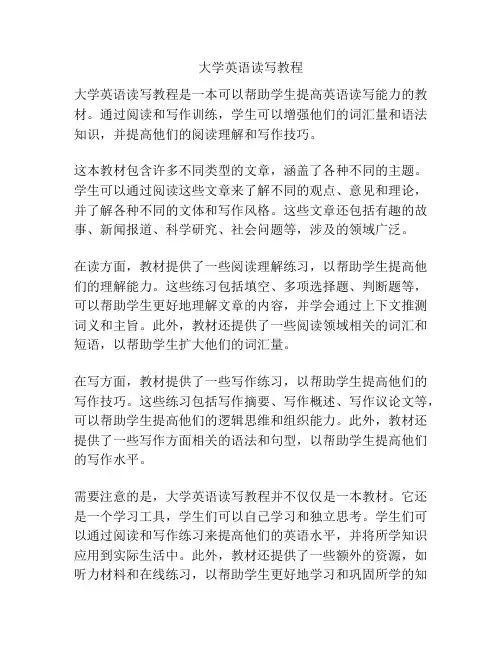
大学英语读写教程大学英语读写教程是一本可以帮助学生提高英语读写能力的教材。
通过阅读和写作训练,学生可以增强他们的词汇量和语法知识,并提高他们的阅读理解和写作技巧。
这本教材包含许多不同类型的文章,涵盖了各种不同的主题。
学生可以通过阅读这些文章来了解不同的观点、意见和理论,并了解各种不同的文体和写作风格。
这些文章还包括有趣的故事、新闻报道、科学研究、社会问题等,涉及的领域广泛。
在读方面,教材提供了一些阅读理解练习,以帮助学生提高他们的理解能力。
这些练习包括填空、多项选择题、判断题等,可以帮助学生更好地理解文章的内容,并学会通过上下文推测词义和主旨。
此外,教材还提供了一些阅读领域相关的词汇和短语,以帮助学生扩大他们的词汇量。
在写方面,教材提供了一些写作练习,以帮助学生提高他们的写作技巧。
这些练习包括写作摘要、写作概述、写作议论文等,可以帮助学生提高他们的逻辑思维和组织能力。
此外,教材还提供了一些写作方面相关的语法和句型,以帮助学生提高他们的写作水平。
需要注意的是,大学英语读写教程并不仅仅是一本教材。
它还是一个学习工具,学生们可以自己学习和独立思考。
学生们可以通过阅读和写作练习来提高他们的英语水平,并将所学知识应用到实际生活中。
此外,教材还提供了一些额外的资源,如听力材料和在线练习,以帮助学生更好地学习和巩固所学的知识。
总之,大学英语读写教程是一本非常重要的教材,它通过阅读和写作训练帮助学生提高他们的英语读写能力。
在教材的指导下,学生们可以扩大他们的词汇量、提高他们的阅读理解和写作技巧,并将所学知识应用到实际生活中。
通过不断的学习和实践,学生们可以逐渐提高他们的英语水平,为他们的大学学习和未来的工作做好准备。
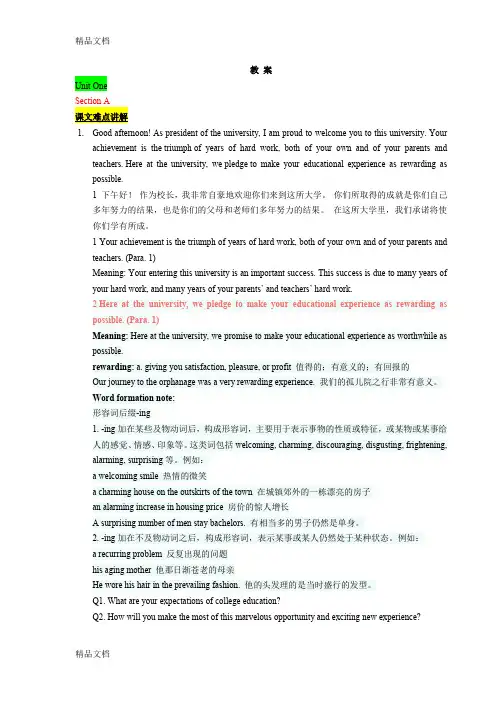
教案Unit One1.Good afternoon! As president of the university, I am proud to welcome you to this university. Yourachievement is the triumph of years of hard work, both of your own and of your parents and teachers. Here at the university, we pledge to make your educational experience as rewarding as possible.1 下午好!作为校长,我非常自豪地欢迎你们来到这所大学。
你们所取得的成就是你们自己多年努力的结果,也是你们的父母和老师们多年努力的结果。
在这所大学里,我们承诺将使你们学有所成。
1 Your achievement is the triumph of years of hard work, both of your own and of your parents andteachers. (Para. 1)Meaning: Your entering this university is an important success. This success is due to many years of your hard work, and many years of your parents’ and teachers’ hard work.2 Here at the university, we pledge to make your educational experience as rewarding aspossible. (Para. 1)Meaning: Here at the university, we promise to make your educational experience as worthwhile as possible.rewarding: a. giving you satisfaction, pleasure, or profit 值得的;有意义的;有回报的Our journey to the orphanage was a very rewarding experience. 我们的孤儿院之行非常有意义。
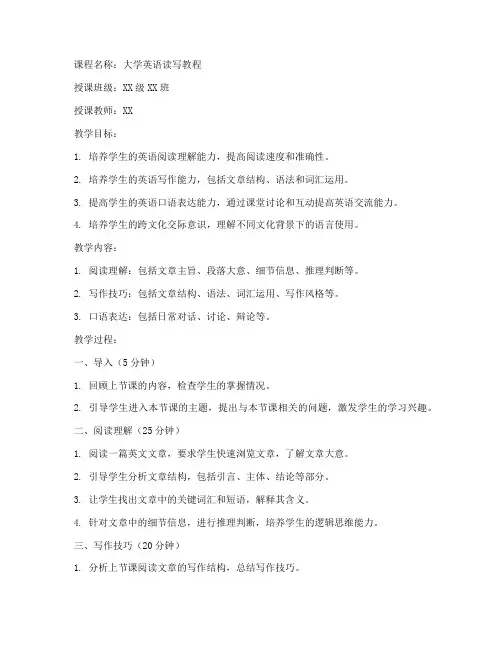
课程名称:大学英语读写教程授课班级:XX级XX班授课教师:XX教学目标:1. 培养学生的英语阅读理解能力,提高阅读速度和准确性。
2. 培养学生的英语写作能力,包括文章结构、语法和词汇运用。
3. 提高学生的英语口语表达能力,通过课堂讨论和互动提高英语交流能力。
4. 培养学生的跨文化交际意识,理解不同文化背景下的语言使用。
教学内容:1. 阅读理解:包括文章主旨、段落大意、细节信息、推理判断等。
2. 写作技巧:包括文章结构、语法、词汇运用、写作风格等。
3. 口语表达:包括日常对话、讨论、辩论等。
教学过程:一、导入(5分钟)1. 回顾上节课的内容,检查学生的掌握情况。
2. 引导学生进入本节课的主题,提出与本节课相关的问题,激发学生的学习兴趣。
二、阅读理解(25分钟)1. 阅读一篇英文文章,要求学生快速浏览文章,了解文章大意。
2. 引导学生分析文章结构,包括引言、主体、结论等部分。
3. 让学生找出文章中的关键词汇和短语,解释其含义。
4. 针对文章中的细节信息,进行推理判断,培养学生的逻辑思维能力。
三、写作技巧(20分钟)1. 分析上节课阅读文章的写作结构,总结写作技巧。
2. 分组讨论,让学生根据所学技巧,尝试写一段短文。
3. 教师点评,指出学生的优点和不足,提供修改建议。
四、口语表达(20分钟)1. 让学生就阅读文章中的某个话题进行讨论,锻炼口语表达能力。
2. 进行角色扮演,模拟实际场景,提高学生的交际能力。
3. 教师点评,鼓励学生积极参与,提高口语水平。
五、课堂小结(5分钟)1. 总结本节课所学内容,强调重点和难点。
2. 布置课后作业,包括阅读文章、写作练习和口语练习。
教学评价:1. 阅读理解:通过课后作业和课堂测试,评价学生的阅读理解能力。
2. 写作技巧:通过学生写作练习和教师点评,评价学生的写作水平。
3. 口语表达:通过课堂讨论和角色扮演,评价学生的口语表达能力。
教学反思:1. 教师应根据学生的实际情况,调整教学进度和难度。
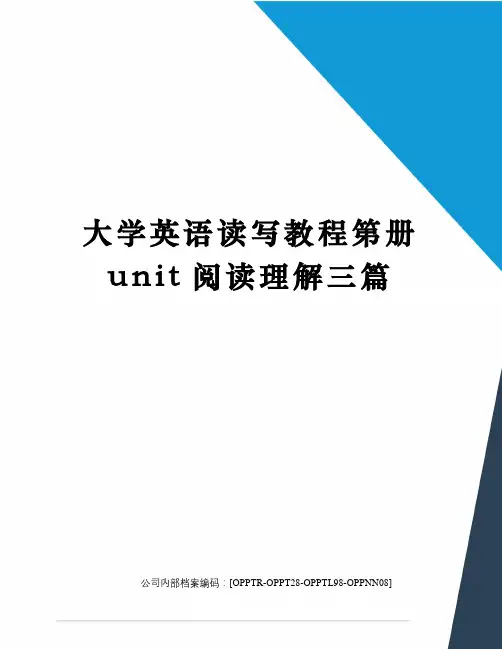
大学英语读写教程第册u n i t阅读理解三篇公司内部档案编码:[OPPTR-OPPT28-OPPTL98-OPPNN08]unit 8Part 1 Reading comprehensionDirections: Read the following passages carefully. Each passage is followed by some questions or unfinished sentences. For each of them there arefour choices marked A, B, C, and D. Choose the best answer to each question.Questions 1 to 5 are based on the same passage or dialog.Manners evolved differently in different cultures. In earlier times there was a tendency for manners to become increasingly formal, and this was often viewed as progress. In the 18th and 19th centuries having good manners was seen as an important part of one's education and social class, and it was necessary to be taken as a lady or a gentleman to get ahead in the world.In the 20th and 21st centuries, manners have gradually become more relaxed and informal. The hosting of dinners and other social gatherings are no longer the exclusive privilege of the wealthy elite (精英), and private clubs are being gradually replaced by more open meeting places. So the manners of the salon (沙龙) are gradually combining with the manners of the pub. Clothing is a good indication of the changes in manners, as can be seen in the following examples.It is surprising that the wearing of hats indoors by males is once again becoming acceptable. Students in North America often wear baseball caps to class. In many countries the wearing of hats indoors by males was once acceptable even in very polite society, but over the years this became considered as a lower-class behavior and was thus discouraged in both the middle and upper classes. The young people who wearhats indoors do not realize they are actually restarting a very old cultural tradition.A comparable development for females is the wearingof jeans. Many females now wear jeans on a daily basis, either at home or at work. Some see this as a symbolic declaration that they are now modern women, not girls or ladies. Some girls, like boys, wear baseball caps both indoors and outdoors.Sneakers and shorts are now acceptable for either males or females in a variety of non-athletic situations. Some companies have rules requiring informal dress such as jeans or sneakers on Fridays (called "dress-down Friday" or "casual Friday"), and others permit it almost all the time. In these companies, and many others, it is acceptable to call the bosses by their first names.1.What does the passage mainly talk aboutA. Changes of manners over time.B. Formal manners in the earlier times.C. Different manners in different cultures.D. Development of manners in different classes.2.In the 20th and 21st centuries, _________.A. manners are not as formal as in the pastB. manners in a pub are getting more and moreformalC. proper clothing is a good indication of goodmannersD. rich people no longer behave formally in socialgatherings3.According to the passage, "the manners of thesalon" in paragraph 2 most likely refers to__________.A. Formal manners of drinking.B. Informal manners of drinking.C. Formal manners at social gatherings.D. Informal manners at social gatherings.4.According to the passage, nowadays wearing a hatindoors can actually be viewed as _________.A. a revolutionB. social progressC. a worsening situationD. a return to the old tradition5.According to the author, today wearing hatsindoors, and wearing jeans at work mainly indicate that _________.A. women are no longer inferior to menB. people no longer pay attention to dressingdetailsC. people are getting more relaxed in terms ofmannersD. some companies have lower requirements fortheir employeesQuestions 6 to 10 are based on the same passage or dialog.Between the 1950s and the early 1980s, the evolving role of Japanese women had been most obvious in their attitudes toward marriage and the family system. There had been a trend away from arranged marriages. Many young women admitted that they took paid employment mostly in order to find a husband on their own. In spite of this and other influences a 1982 figure showed that almost 40 percent of marriages were still arranged. This figure was, however, half the size of a 1955 survey which showed that almost 81 percent of marriages were arranged. Once married, many women in the early 1980s continued to work, and increasingly they returned to work after childbirth, something which was hard to imagine a generation before. A woman's role in the family was evolving as well, becoming more and more dominant.Women had sought more personal satisfaction fromtheir lives since 1950s. In the beginning ofthe1980s, during their lives before marriage women made up an almost free-wheeling (随心所欲) part ofJapanese society. A survey of new brides reportedthat only 12 percent expected their marriage to be happy. At that time, Japanese still regarded marriage not as the peak of a romance but as a duty that was primarily social and practical in significance. As a result, Japanese women took full advantage of their years before marriage. Most women remained at home while working, living with their family in a sort of extended dependency. Japanese women, however, must be careful to maintain themselves within acceptable social standards, one woman being told, "If you act like that, you will not be wanted as a bride."Once married a Japanese women found herself in a role opposite of the perceived sex roles in Japan – the female was dominant in the house. The relationship between the partners of a Japanese marriage clearly showed the evolving role of women. It must be remembered that a short one hundred years ago the attitude toward women was that "In everything she must obey her husband". By the early 1980s the role of women had changed: A Japanese woman had almost unquestioned power within the family system oftoday's Japan.6.What is the passage mainly aboutA. Changes in the role of Japanese women.B. Changes in the styles of Japanese marriages.C. Japanese women's struggle for independence.D. Japanese women's increased power in theirfamilies.7.What did the author say about Japanese womenbefore the 1950sA. Many women continued to work after marriage.B. A majority of women had their marriagesarranged.C. Only less than half of women had arrangedmarriages.D. Many women went to work in order to find ahusband.8.What was marriage in many Japanese people's eyesin the early 1980sA. It was the end of their romance.B. It was the beginning of a happy life.C. It was a social responsibility one has tofulfill.D. It was the highest point of their romanticrelationship.9.Which of the following was the main cause formost Japanese women in the early 1980s to takefull advantage of their years before marriageA. They believed they would no longer have ahappy life after marriage.B. They knew they could not be as dominant asbefore after getting married.C. They should not go beyond acceptable socialstandards after marriage.D. They would no longer have time to work aftermarriage.10."The perceived sex roles" in the last paragraphmost probably refers to the fact that thewife_________.A. had to obey the husband in the familyB. had to support the husband and his familyC. could make decisions on everything in thefamilyD. could question some of the husbands' decisions Questions 11 to 15 are based on the same passage or dialog.Leadership is the ability of a person to guide people in a group toward achieving a task at hand. I believe that leaders are made; they are not born and a person can always be a good leader if he makes full use of the following list of leadership strengths.Firstly, task execution (实施) is one of the most important leadership strengths. Coming up with a brilliant idea and executing that idea are twocompletely different things. Bringing an idea to life is a lot easier said than done. An idea really comes to life only when it is executed to perfection. For this, you need to be a team player. There is a fine line between having followers that follow you out of respect and having followers that follow you because they have no choice. Any kind of disagreement in the team will affect the end result and the efficiency of performing the task.Secondly, before you go on to put any kind of strategy into place, you need to understand and envision what you wish to achieve. This is important because the expectations of the entire group willride on your shoulders. Thus, one of the important leadership strengths is to have a very clear vision about how to go about a task at hand, keeping the long-term and short-term goals and consequences in mind. You need to be practical yet optimistic about the possibilities involved in any task and must take into consideration all the risks involved.Thirdly, being the leader does not mean that you own the people you work with. Many people tend to get carried away and do not listen to their team members. This can go against them as the team members then tend to lose respect for their leader. You need to genuinely listen to your team members because they are the only ones that will tell you if you go wrong at any point of time. Furthermore, listening will make sure that you connect with your team members on a personal level, which will improve the performance of your team greatly.11.Which of the following is NOT mentioned in thepassage as one of the leadership strengthsA. Lending an ear to team members.B. Performing a task in a perfect way.C. Accepting mistakes with good grace.D. Planning for the future with a clear goal.12.According to Paragraph 2, a good leader should___________.A. lead his followers with absolute authorityB. make his followers follow him out of respectC. be able to find out who is a true follower inthe teamD. focus on creating new ideas instead ofexecuting them13.What does "envision" most probably mean inParagraph 3A. To remain optimistic about future results.B. To focus all his attention on long-term goals.C. To meet the expectations of the entire teammembers.D. To forecast the possible achievements andconsequences.14.Which of the following should be avoided as agood leaderA. Holding a realistic attitude.B. Considering short-term goals.C. Thinking about the bad results of a plan.D. Ignoring disagreement from his team members.15.What is the author's attitude about becoming agood leaderA. You can be a good leader if you have talents.B. You can be a good leader if you have a goodteam.C. You can be a good leader if you acquire theessential skills.D. You can be a good leader as long as you aredetermined to be one.。
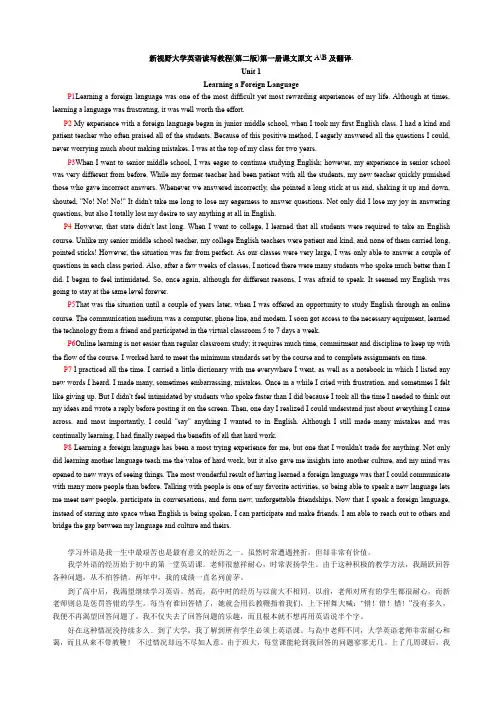
新视野大学英语读写教程(第二版)第一册课文原文A\B及翻译.Unit 1Learning a Foreign LanguageP1Learning a foreign language was one of the most difficult yet most rewarding experiences of my life. Although at times, learning a language was frustrating, it was well worth the effort.P2 My experience with a foreign language began in junior middle school, when I took my first English class. I had a kind and patient teacher who often praised all of the students. Because of this positive method, I eagerly answered all the questions I could, never worrying much about making mistakes. I was at the top of my class for two years.P3When I went to senior middle school, I was eager to continue studying English; however, my experience in senior school was very different from before. While my former teacher had been patient with all the students, my new teacher quickly punished those who gave incorrect answers. Whenever we answered incorrectly, she pointed a long stick at us and, shaking it up and down, shouted, "No! No! No!" It didn't take me long to lose my eagerness to answer questions. Not only did I lose my joy in answering questions, but also I totally lost my desire to say anything at all in English.P4However, that state didn't last long. When I went to college, I learned that all students were required to take an English course. Unlike my senior middle school teacher, my college English teachers were patient and kind, and none of them carried long, pointed sticks! However, the situation was far from perfect. As our classes were very large, I was only able to answer a couple of questions in each class period. Also, after a few weeks of classes, I noticed there were many students who spoke much better than I did. I began to feel intimidated. So, once again, although for different reasons, I was afraid to speak. It seemed my English was going to stay at the same level forever.P5That was the situation until a couple of years later, when I was offered an opportunity to study English through an online course. The communication medium was a computer, phone line, and modem. I soon got access to the necessary equipment, learned the technology from a friend and participated in the virtual classroom 5 to 7 days a week.P6Online learning is not easier than regular classroom study; it requires much time, commitment and discipline to keep up with the flow of the course. I worked hard to meet the minimum standards set by the course and to complete assignments on time.P7 I practiced all the time. I carried a little dictionary with me everywhere I went, as well as a notebook in which I listed any new words I heard. I made many, sometimes embarrassing, mistakes. Once in a while I cried with frustration, and sometimes I felt like giving up. But I didn't feel intimidated by students who spoke faster than I did because I took all the time I needed to think out my ideas and wrote a reply before posting it on the screen. Then, one day I realized I could understand just about everything I came across, and most importantly, I could "say" anything I wanted to in English. Although I still made many mistakes and was continually learning, I had finally reaped the benefits of all that hard work.P8 Learning a foreign language has been a most trying experience for me, but one that I wouldn't trade for anything. Not only did learning another language teach me the value of hard work, but it also gave me insights into another culture, and my mind was opened to new ways of seeing things. The most wonderful result of having learned a foreign language was that I could communicate with many more people than before. Talking with people is one of my favorite activities, so being able to speak a new language lets me meet new people, participate in conversations, and form new, unforgettable friendships. Now that I speak a foreign language, instead of staring into space when English is being spoken, I can participate and make friends. I am able to reach out to others and bridge the gap between my language and culture and theirs.学习外语是我一生中最艰苦也是最有意义的经历之一。
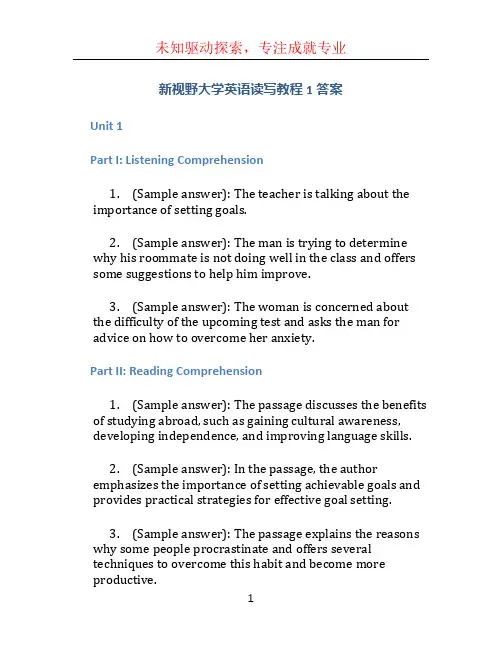
新视野大学英语读写教程1答案Unit 1Part I: Listening Comprehension1.(Sample answer): The teacher is talking about the importance of setting goals.2.(Sample answer): The man is trying to determine why his roommate is not doing well in the class and offers some suggestions to help him improve.3.(Sample answer): The woman is concerned about the difficulty of the upcoming test and asks the man for advice on how to overcome her anxiety.Part II: Reading Comprehension1.(Sample answer): The passage discusses the benefits of studying abroad, such as gaining cultural awareness, developing independence, and improving language skills.2.(Sample answer): In the passage, the author emphasizes the importance of setting achievable goals and provides practical strategies for effective goal setting.3.(Sample answer): The passage explains the reasons why some people procrastinate and offers several techniques to overcome this habit and become more productive.Part III: Vocabulary1.(Sample answer):–Potential (adj.): describing or showing the possibility of developing something in the future.–Motivation (n.): the reason or reasons one has for acting or behaving in a particular way.–Objective (n.): a goal or aim.–Overcome (v.): succeed in dealing with (a problem or difficulty).–Distraction (n.): a thing that prevents someone from concentrating on something else.2.(Sample answer):–Anxiety (n.): a feeling of apprehension or unease.–Estimation (n.): a rough calculation or rough judgment.–Satisfactory (adj.): fulfilling expectations or needs; acceptable, though not outstanding or perfect.–Procrastination (n.): the action of delaying or postponing something.–Prioritize (v.): designate or treat (something) as more important than other things.Part IV: Error Correction1.(Sample answer):–Original: She learn English since she was a child.–Corrected: She has been learning English since she was a child.2.(Sample answer):–Original: I have eaten lunch at 12 a.m.–Corrected: I had lunch at 12 noon.Unit 2Part I: Listening Comprehension1.(Sample answer): The man is asking for directions to the nearest post office.2.(Sample answer): The woman is discussing the advantages and disadvantages of online shopping with her friend.3.(Sample answer): The speaker is explaining the steps to follow when applying for a visa.Part II: Reading Comprehension1.(Sample answer): The passage compares Western and Eastern communication styles, highlighting the directness and individualism of Western communication and the indirectness and collectivism of Eastern communication.2.(Sample answer): In the passage, the author discusses the benefits of traveling and provides insight on how it broadens one’s perspective, enhances self-awareness, and promotes personal growth.3.(Sample answer): The passage explores the phenomenon of culture shock, explains its causes and symptoms, and offers advice on how to cope with it through immersion and an open mind.Part III: Vocabulary1.(Sample answer):–Navigate (v.): plan and direct the route or course of a ship, aircraft, or other form oftransportation.–Authentic (adj.): of undisputed origin; genuine.–Accommodate (v.): provide lodging or sufficient space for.–Barrier (n.): a fence or other obstacle that prevents movement or access.–Comprehend (v.): grasp mentally; understand.2.(Sample answer):–Integrate (v.): combine (one thing) with another so that they become a whole.–Encounter (v.): unexpectedly experience or be faced with (something difficult or hostile).–Etiquette (n.): the customary code of polite behavior in society or among members of a particularprofession or group.–Underestimate (v.): estimate (something) to be smaller or less important than it actually is.–Fluent (adj.): able to express oneself easily and articulately.Part IV: Error Correction1.(Sample answer):–Original: I went to library yesterday.–Corrected: I went to the library yesterday.2.(Sample answer):–Original: The train have already left.–Corrected: The train has already left.These are just sample answers to the questions and exercises in the New Horizon’s College English Reading and Writing Coursebook 1. It is important to note that answers may vary, and it’s recommended to refer to the official answer key provided by the textbook publisher for complete accuracy.。
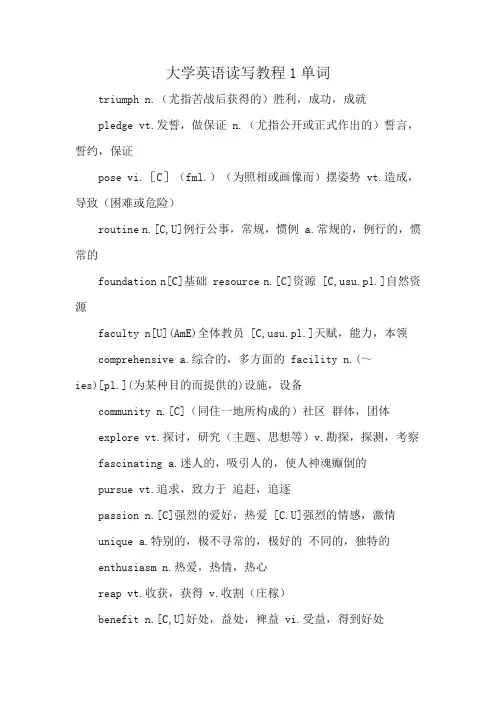
大学英语读写教程1单词triumph n.(尤指苦战后获得的)胜利,成功,成就pledge vt.发誓,做保证 n.(尤指公开或正式作出的)誓言,誓约,保证pose vi.[C](fml.)(为照相或画像而)摆姿势 vt.造成,导致(困难或危险)routine n.[C,U]例行公事,常规,惯例 a.常规的,例行的,惯常的foundation n[C]基础 resource n.[C]资源 [C,usu.pl.]自然资源faculty n[U](AmE)全体教员 [C,usu.pl.]天赋,能力,本领comprehensive a.综合的,多方面的 facility n.(~ies)[pl.](为某种目的而提供的)设施,设备community n.[C](同住一地所构成的)社区群体,团体explore vt.探讨,研究(主题、思想等)v.勘探,探测,考察fascinating a.迷人的,吸引人的,使人神魂癫倒的pursue vt.追求,致力于追赶,追逐passion n.[C]强烈的爱好,热爱 [C.U]强烈的情感,激情unique a.特别的,极不寻常的,极好的不同的,独特的enthusiasm n.热爱,热情,热心reap vt.收获,获得 v.收割(庄稼)benefit n.[C,U]好处,益处,裨益 vi.受益,得到好处opportunity n.[C,U]机会,时机overwhelm vt.(usu.passive)(数量大得)使无法对付available a.(oftem after noun)可获得的,可利用的,现成的sample vt.体验,对…作抽样检验 n.[C]样本,样品,货样assume vt.假定,假设,认为emerge vi.出现,为…所公认出现露出giant a.(only before noun)巨大的,特大的mate n.[C]同事,同伴roommate n.[C](尤指大学里的)室友owl n.[C]猫头鹰virtual a.(only before noun)几乎相同的,实质上的虚拟的,模拟的virtually ad.实际上,几乎,差不多虚拟地,模拟地enrich vt.使丰富,充实,强化glow n.[sing.](某种)强烈的情感柔和稳定的光 vi.发出柔和稳定的光confidence n.[U]信心,信赖,信任自信心yield vt.产生(结果等)出产,产生 vi.屈从,让步abundant a.(fml)大量的,丰富的,充裕的responsibility n.[C](道德,社会)责任,义务inherit vt.沿袭,秉承(信仰,传统或生活方式)v.继承(财产)inheritor n.[C](生活或思想方式的)后继者,继承人遗产继承人transmit vt.(fml.)传送,传递,传播acquire vt.学到,获得(知识,技能)取得,获得prosperous a.(fml)富裕的,繁荣的,兴旺的participate vi.参加,参与incredible a.极好的,极大的不可相信的,难以置信的deny vt.否认,否定undeniably ad.不可否认地,无可争辩地depart v.离开(尤指动身去旅行),启程,上路inquisitive a.好学的,好问的过分好问的,好打听的engage vt.吸引住(某人的兴趣,注意力)vi(~in/on/upon)参加,参与(活动)despair vi.绝望,感到无望 n.绝望embrace vt.(fml.)欣然接受,乐意采纳 v.抱,拥抱stimulate vt.激发,鼓励,激励|刺激,促使,促进intellectual a.智力的,脑力的capacity n.[C,U]能力,才能 [sing.]容量,容积,容纳能力bind vt (bound,bound)使受(规则或协议)约束|捆,绑assure vt.向……保证,使确信assured a.有把握的,自信的,肯定的career n.[C]职业,事业curve n.[C]曲线,弧线decent a.可接受的,相当好的,像样的|正派的,规矩的boast v.夸口,夸耀,吹嘘bond n.纽带,联系,关系 vi.(与某人)培养一种特殊的关系blossom vi.发展,成长,繁盛,兴旺decade n.[C]十年,十年期genuine a.真诚的,诚挚的|真正的,非伪造的instinct n.[C,U]本能,直觉,天性confident a.有信心的,自信的|确信的,有把握的secure a.自信的,有把握的|安全的stereotype n.[C]模式化的思想,旧框框comprehend v.(not in progressive)理解,领悟cultivate vt.培养,养成|耕,耕作,开恳range n.[C,usu.sing]一系列innocence n.[U]涉世不深,天真,单纯|清白,无罪curiosity n.[sing,U]好奇心amount n.[C,U]数额,数量flexibility n.[U]灵活性approach vt.处理,对付 v.接近,靠近 n.[C]方式,方法enthusiastic a.热心的,热衷的entbusiastically ad.热心地,衷心地talent n.[C,U]天资,天赋才能evolve v.逐步发展,逐渐演变|进化,进化形成potential n.潜能,潜力 a.(only before noun)可能的,潜在的bold a.果敢的,敢于冒险的,大胆的enormous a.巨大的,庞大的enormously ad.非常,极其。
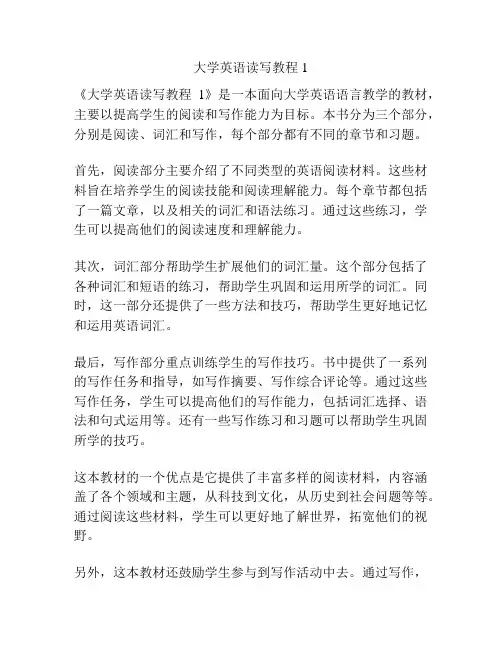
大学英语读写教程1《大学英语读写教程1》是一本面向大学英语语言教学的教材,主要以提高学生的阅读和写作能力为目标。
本书分为三个部分,分别是阅读、词汇和写作,每个部分都有不同的章节和习题。
首先,阅读部分主要介绍了不同类型的英语阅读材料。
这些材料旨在培养学生的阅读技能和阅读理解能力。
每个章节都包括了一篇文章,以及相关的词汇和语法练习。
通过这些练习,学生可以提高他们的阅读速度和理解能力。
其次,词汇部分帮助学生扩展他们的词汇量。
这个部分包括了各种词汇和短语的练习,帮助学生巩固和运用所学的词汇。
同时,这一部分还提供了一些方法和技巧,帮助学生更好地记忆和运用英语词汇。
最后,写作部分重点训练学生的写作技巧。
书中提供了一系列的写作任务和指导,如写作摘要、写作综合评论等。
通过这些写作任务,学生可以提高他们的写作能力,包括词汇选择、语法和句式运用等。
还有一些写作练习和习题可以帮助学生巩固所学的技巧。
这本教材的一个优点是它提供了丰富多样的阅读材料,内容涵盖了各个领域和主题,从科技到文化,从历史到社会问题等等。
通过阅读这些材料,学生可以更好地了解世界,拓宽他们的视野。
另外,这本教材还鼓励学生参与到写作活动中去。
通过写作,学生可以巩固他们的语言表达能力,提高他们的思维能力和逻辑思维能力。
而且,写作训练也是在各个学科和领域中非常重要的一部分,可以帮助学生更好地理解和应用所学的知识。
总之,《大学英语读写教程1》是一本很好的教材,适用于大学英语语言教学。
它提供了丰富多样的阅读材料和写作训练,帮助学生提高他们的阅读和写作能力。
此外,这本教材还注重词汇训练,帮助学生扩展他们的词汇量。
综合来看,这本教材是学习大学英语的必备工具。
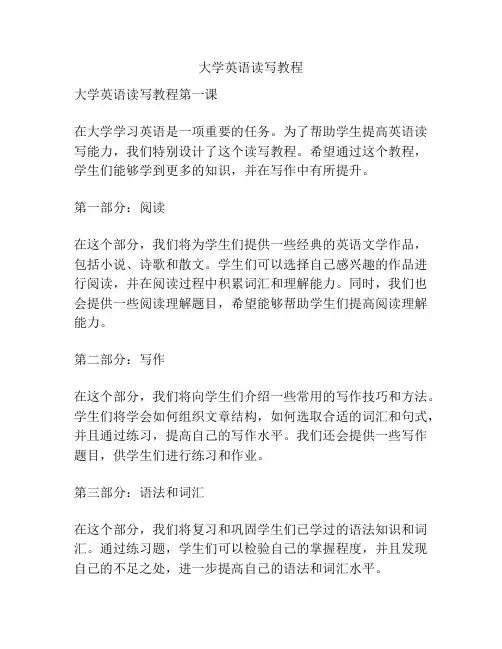
大学英语读写教程
大学英语读写教程第一课
在大学学习英语是一项重要的任务。
为了帮助学生提高英语读写能力,我们特别设计了这个读写教程。
希望通过这个教程,学生们能够学到更多的知识,并在写作中有所提升。
第一部分:阅读
在这个部分,我们将为学生们提供一些经典的英语文学作品,包括小说、诗歌和散文。
学生们可以选择自己感兴趣的作品进行阅读,并在阅读过程中积累词汇和理解能力。
同时,我们也会提供一些阅读理解题目,希望能够帮助学生们提高阅读理解能力。
第二部分:写作
在这个部分,我们将向学生们介绍一些常用的写作技巧和方法。
学生们将学会如何组织文章结构,如何选取合适的词汇和句式,并且通过练习,提高自己的写作水平。
我们还会提供一些写作题目,供学生们进行练习和作业。
第三部分:语法和词汇
在这个部分,我们将复习和巩固学生们已学过的语法知识和词汇。
通过练习题,学生们可以检验自己的掌握程度,并且发现自己的不足之处,进一步提高自己的语法和词汇水平。
第四部分:综合训练
在这个部分,我们将提供一些综合训练题目,包括阅读、写作和语法等方面的题目。
通过这些综合训练,学生们可以综合应用所学的知识,并全面提高自己的英语水平。
在整个教程中,我们鼓励学生们多进行听说读写方面的训练,并且提供了一些相关的学习资源和练习材料。
希望学生们能够认真学习,并在实践中不断提高自己的英语能力。
大学英语三(读写)教案10)ingenious a.good at inventing things and solving problems in new ways (人)有独创性的They are attacking the honest and ingenious scientist because his ideas are new.他们攻击这位诚实并富有独创能力的科学家, 是因为他的观点新颖。
2 .While-reading ActivitiesStep 4.Intensive readingStudents are asked to read the passage carefully again and answer some detailed questions on the screen.During the reading, there is an explanation for the following points:Language Points:1.That year every guy on campus had a leather jacket, and Rob couldn’t stand the idea of being the onlyfootball player who didn’t, so he made a pact that he’d give me his girl in exchange for my jacket.(Para.1)Meaning: That year every young man in the college wore a leather jacket.Rob was the only one in the football team who didn’t have one.He felt frustrated whenever he thought about it, so he made an agreement with me that if I gave him my leather jacket, he would, as an exchange, give me his girlfriend.2.make a pact: 达成协议in exchange for: 作为(对...的)交换3.If I could show the elite law firms I applied to that I had a radiant, well-spoken counterpart by my side, Ijust might edge past the competition.(Para.2)Meaning: When looking for a job, if I could show the top law companies that I had a partner who was not only beautiful but also intelligent and polite, I might well be able to gain an advantage over mycompetitors and successfully get a job offer.3. “Radiant”she was already.I could dispense her enough pearls of wisdom to make her “well-spoken”.(Para.3)Meaning: She was already very beautiful.And I could teach her to speak intelligently so that she would sound very pleasant and smart when she speaks.Meaning beyond words: The word “dispense”, which means “give sth.to people”, shows that the narratorregards himself far superior to the girl.He is again boasting and praising himself.The word shows hisarrogance and conceit.4.After a banner day out, I drove until we were situated under a big old oak tree on a hill off the expressway.(Para.4)Meaning: After spending an excellent day out with her, I drove my car to a hill by the highway.I stopped when we were under a big old oak tree.5.banner a.极好的;非常成功的n.横幅;横幅标语She seemed to have a good time.I could safely say my plan was underway.I took her home and set a date for another conversation.(Para.15)Meaning: It seemed that she had enjoyed my logic lesson very much.I was pretty sure that my plan was going on smoothly.I drove her home and decided on a date for our next meeting.underway 在进行中set a date for 为.....定日期 e.g.They will set a date for the wedding.6. “The situations are altogether different.You can’t make an analogy between them”.(Para.24)Meaning: The situations are totally different.You can’t make a comparison between them.Make/ draw an analogy between: 在.....之间作类比E.g.It is difficult to make an analogy between cars and airplanes.把汽车和飞机进行类比是很难的。
大学英语教材读写教程1大学英语教材《读写教程1》是为大学本科生编写的一套英语教材。
本教材旨在帮助学生提高英语阅读和写作能力,培养学生批判性思维和有效的表达能力。
下面将从教材特点、教学方法以及教材优势等方面展开论述。
教材特点首先,教材注重跨学科的内容选择。
教材中选取了来自不同学科领域的文章,如科学、文学、社会学等,以满足学生对多样化知识的需求。
通过涉及不同领域的文章,学生能够更好地了解和掌握相关领域的专业词汇和术语,提高学科学习的能力。
其次,教材注重分层次、渐进式的教学安排。
《读写教程1》的内容难度呈递增趋势,从简单到复杂,从浅入深。
这样的设置有助于学生逐步掌握英语阅读的技巧和方法,从而提高阅读效率和理解能力。
同时,每个单元都有相应的阅读理解和写作练习,使学生在阅读的基础上,能够更好地培养写作能力。
教学方法为了更好地实现教材的教学目标,《读写教程1》采用了多种教学方法。
首先,教材采用主题式教学。
每个单元的文章都围绕特定主题展开,如环保、文化交流、科技发展等,通过这样的设置,学生能够更好地了解和思考相关主题,并且能够通过写作表达自己的观点和看法。
其次,教材注重语言实践教学。
教材中的文章都是真实世界中的英语材料,包括新闻报道、学术文章、文学作品等。
通过阅读和写作练习,学生能够接触到真实的英语语言环境,提高语言运用能力。
教材优势《读写教程1》有以下几个优势。
首先,教材内容丰富多样。
从各个学科领域中精选出的文章丰富了学生的知识储备,并且培养了他们对跨学科知识的理解与应用能力。
其次,教材注重阅读与写作的结合。
每个单元都有相应的写作练习,并且给予学生写作指导和反馈,使学生能够在阅读的基础上,提高写作能力。
再次,教材配套资源丰富。
除了教材本身的文章和练习外,教材还提供了课后练习题、教师辅导书、听力材料等,帮助学生进一步巩固和扩展学习内容。
总结《大学英语教材读写教程1》通过精选的文章、分层次的教学以及多样化的教学方法,帮助学生提高英语阅读和写作能力,拓展学科知识,培养学生综合运用英语的能力。
Unit 1b Text A Exercise V 1. solu ons 2. ignore 3. persuade 4. assign 5. deadline 6. approach 7. stuck 8. essen als 9. managed 10. necessarily 11. retained 12. due dra VI 1. put in 2. make the most of 3. put down 4. lead to 5. get her hands on 6. put away our picnic things 7. to s ck to 8. me a er me 9. has cut down on smoking 10. counts for much more VIII 1. thus cu ng down on our costs 2. while having his breakfast 3. 3. so so so that that that he he he can can can memorize memorize memorize a a a couple couple couple of of of new new new words words everyday while cooking his meals 4. thus greatly increasing his reading speed 5. 5. while while while studying studying studying Chinese Chinese Chinese modern modern modern history history history at at at Beijing Beijing University 6. thus being able to do very well in their work 7. while doing his homework 8. so that you can become one too IX 1. used to go 2. got used to ge ng 3. used to study has got used to working 4. used to say 5. used to write got used to communica ng XI 1. went unno ced 2. go unpunished 3. go uncorrected 4. goes unno ced unmen oned 5. go unreported XIII. Transla on 1. Tom a very curious boy is interested not only in whats but also in whys and hows. 2. According According to Professor Smith to Professor Smith happiness is the ability to make the most of what you have. 3. 3. You’d You’d You’d be er be er be er keep keep keep the the the book book book where where where your your your 151515-year-old -year-old son can’t get his hands on it.4. The story was so funny that Bill kept laughing all the me while reading it. 5. 5. High-achieving High-achieving High-achieving students students students do do do not not not necessarily necessarily necessarily put put put in in more more me me me at at at their their their studies studies studies than than than their their their lower-scoring lower-scoring classmates. 6. How did you manage manage to to persuade persuade these these students students to to take the speed-reading course? 7. Working hard is important but knowing how to make the most of one’s abili es counts for much more.8. She asked her students to think for themselves rather than telling them what to think. Text B Exercise I 1. opposite 2. preference 3. located 4. feasible 5. perspec ve 6. have shi ed 7. concern 8. a rac ve 9. survive 10. transfer 11. prospect 12. par cularly 13. treasure 14. Despite II 1. on the other hand 2. keep up 3. As for 4. for good 5. turned out 6. come of age 7. what if 8. welled up Unit 2 Text A Exercise III 1. response 2. bounced 3. Conversa on 4. previous 5. encouragement 6. parallel IV 1. en rely 2. objec on 3. challenged 4. original 5. responsible 6. rela ve 7. halfway 8. startled 9. simply 10. back and forth 11. joined in 12. just as 13. knocked down 14. came to a halt 15. Even if 16. fell apart V 1. unconsciously 2. response 3. previous 4. suitable 5. even though 6. disagree 7. topic 8. calling on 9. switched 10. and so on 11. in line 12. take turns VI 1. Excellence 2. independence 3. intelligence 4. significance 5. pa ence 6. silence 7. violence 8. differences 9. distance 10. confidence VII 1. disappeared 2. disorder 3. dishonest 4. disobey 5. disagree 6. disadvantages 7. discomfort 8. dislike 9. disbelief 10. dissa sfied VIII (A) 1. Whoever is most qualified 2. Whoever has money 3. Whoever holds it 4. whoever is not with him 5. whoever would take the job 6. Whoever fears to face his own past (B) 1. Whatever they have 2. whatever decisions he makes 3. Whenever the weather is bad 4. wherever he goes 5. Whichever direc on you turn to 6. however hard she tried IX 1. No wonder it’s freezing cold today2. No wonder there is no picture on the screen 3. No wonder many career women are not married 4. No wonder they asked so many ques ons 5. No wonder it has become a best-seller of this spring 6. No wonder US students are anxious about math XII 1. Referring to the differences between American English and Bri sh English he said “The United States and Britain are two different countries a er all.”2. Professor Professor Smith Smith encourages encourages his his students students to to think for themselves. themselves. He He He o en o en o en says says says “I “I “I am am am just just just as as as happy happy happy even even even if if you challenge me or completely disagree with me.”3. 3. We We We called called called on on on him him him to to to take take take part part part in in in our our our conserva on conserva on about pop music but as soon as he joined in he introduced a new topic and referred to the NBA finals of the previous week. 4. 4. The The The driver driver driver is is is responsible responsible responsible for for for this this this accident. accident. accident. His His His car car knocked down a tree and a man on his bike. 5. Since our produc on of radios came to a halt we have switched to the produc on of mobile phones. 6. Our original plan was to see such famous sights as the Great Wall the Palace Museum and the Summer Palace in Beijing. 7. It’s no simple ma er to learn a foreign language well. Even though I have learned English for a few years I s ll can’t express myself effec vely in the language.8. I don’t want you simply to agree or disagree with me –I I need need need someone someone someone who who who can can can give give give me me me good good good advice advice advice ideas ideas and so on. Text B Exercise I 1. academic 2. intelligence 3. reflects 4. Social 5. predicted 6. context 7. advantage 8. a tude 9. traits 10. communica on 11. dis nguish 12. represented 13. influences 14. mature II 1. ge ng…across2. come out 3. Because of 4. in short 5. as a result 6. as well 7. in some cases 8. sent out Unit 3 Text A Exercise IV 1. draw 2. bear 3. worn out 4. got red of 5. racial 6. paid a en on to 7. mature 8. broke into 9. performed 10. conquer 11. aspects 12. As far as V 1. Brought up 2. broke into running 3. amazed 4. All his wife could do was 5. resemble 6. with ease 7. conquered 8. wear out / are worn out 9. turned out 10. has grown into 11. tragedy 12. promptly VI 1. personal 2. tradi onal 3. humorous 4. logical 5. courageous 6. poisonous 7. educa onal 8. victorious VII 1. darkness 2. carelessness 3. nervousness 4. preparedness 5. illness 6. eagerness / nervousness VIII 1. go on playing 2. went on reading 3. went on to explain 4. went on to teach 5. went on playing 6. went on to tell X 1. work as fast as a skilled worker 2. couldn’t perform as well as his parents had expected 3. he promised that he would go and see his grandparents as o en as possible 4. that a er finishing his studies abroad he would come back as soon as possible XII 1. As far as I know all they have to do is come and see the child they want to bring up and fill out a form. 2. 2. As As As he he he learned learned learned more more more and and and more more more about about about the the the world world world he he finally got red of going a er fame and wealth. 3. The li le girl’s songs brought sunshine to the old man and helped him bear the hardships of life. 4. People came one a er another to congratulate them on the successful building of another big bridge over the Huangpu River. 5. All the people present were amazed that the 10-year-old boy was playing the violin so skillfully. 6. A er the car accident Stevie reevaluated his goals in life life and and and decided decided decided to to to pay pay pay more more more a en on a en on a en on to to to the the the world world outside. 7. Mother could never have imagined that her son would become become a a a world-famous world-famous pianist pianist even even even in in in her her her wildest wildest dreams. 8. The students broke into loud cheers when they heard that their teacher had fought back from the shadow of death. Text B Exercise I 1. poten al 2. sugges ons 3. realis c 4. embarrassed 5. impression 6. nega ve 7. presently 8. reacted 9. improvement 10. target 11. inferior 12. concept II 1. built up 2. dwell on 3. do jus ce to myself 4. from the start 5. were based on 6. set aside 7. wiped out 8. improve on 9. do harm 10. is working on Unit 4 Text A Exercise IV 1. endure 2. accumulated 3. somewhat 4. property 5. informed 6. wrinkled 7. collapsing 8. mourning 9. contributed 10. possessed 11. recovered 12. trembled 13. fulfill 14. drove 15. stagger 16. u ered V 1. because of 2. be blessed with 3. as well as 4. spoke of 5. a good deal of 6. at most 7. stand on its feet 8. be ashamed of 9. as soon as 10. leaning on VI 1. a bearded young man 2. three colored pictures 3. a flowered lawn 4. a gi ed 〈talented〉pianist 5. an old lady with a wrinkled face 6. a home for the aged 7. a cultured college student 8. an experienced driver 9. a skilled engineer 10. a spirited discussion VII 1. shameless 2. cheerful 3. endless 4. windless 5. fearless 6. countless 7. meaningful 8. colorful 9. deligh ul 10. though ul IX 1. Nor did he give me any explana on. 2. Nor did he feel ashamed for that. 3. Nor do I think it necessary to do so. 4. Nor will he invite his rela ves and friends. 5. Nor did we know his phone number. 6. Nor did she enter the home for the aged. XIII 1. Sick and w eak as weak as G randma Grandma is she has undertaken all the housework in the family. 2. 2. The The The recording recording recording company company company had had had never never never been been been so so so pleased pleased with any singer. For them Stevie Wonder was a real find. 3. They had no running water where they lived. Nor did they have conveniences of life such as gas and electricity. 4. 4. Six Six Six years years years passed passed passed then then then seven seven seven and and and eight eight eight and and and nothing nothing was was heard heard heard of of that that French French French ar st. ar st. ar st. It It seemed seemed certain certain certain that that he had le the country for only God knows where. 5. 5. He He He was was was very very very ill ill ill that that that summer summer summer but but but as as as soon soon soon as as as he he he felt felt be er in the fall he resumed his wri ng and finished his novel within two months. 6. Driven by a strong will Alex finally fulfilled the task he had undertaken. 7. With the help of the doctor and the nurses the pa ent recovered quickly and in a few weeks was able to stand on his feet once more. 8. It w as really sad to watch the old man’s wrinkled face was really sad to watch the old man’s wrinkled face which spoke of all that he had endured in his life. Text B Exercise B 1. D 2. D 3. A 4. B 5. A 6. B 7. D 8. A 9. B 10. A Vocabulary Exercises I 1. responsibili es 2. purchase 3. portrays 4. vanished 5. immense 6. decent 7. eventually 8. mo va on 9. reputa on 10. restore 11. neighborhood 12. sustain 13. upholds 14. credit II 1. paved the way for 2. is a ributed to 3. out of habit 4. kept his word 5. open the door to 6. think twice 7. think of … as8. care about 9. had been passed on 10. To this day Unit 5 Text A Exercise V 1. compromise 2. content 3. Unfortunately 4. individual 5. gamble 6. spun 7. a rac ve 8. a erwards 9. tradi on 10. unique 11. arose 12. energe c VI 1. a li le 2. and so on 3. as well 4. give way to 5. in the same way as 6. had in mind 7. most of the me 8. have been on their feet 9. went off 10. are named a er 11. has no right to 12. sorted out VII 1. compromise with…over2. lying…in3. lie on 4. content with 5. call at 6. called on 7. named…a er8. ac ve in 9. opinions about 10. opinion of VIII 1. uncertain 2. unknown 3. unable 4. unfortunate 5. incorrect 6. impa ent 7. illegal 8. irregular 9. irrelevant 10. improper X 1. What a pity you won’t be back before I le ave! 2. What a pity to waste the food! 3. What a pity she isn’t here!4. What a pity that we can die only once for our country! 5. 5. What What What a a a pity pity pity that that that some some some of of of the the the best best best ac ng ac ng ac ng on on on stage stage today can only be seen by so few people! 6. What a pity you can’t swim.XII 1. That’s where2. That’s why3. that’s where4. That’s what5. That’s how6. That’s how7. that’s when8. that’s when9. that’s what10. That’s whereXIV 1. 1. They They They are are are Mary’s Mary’s Mary’s sons sons sons Robert Robert Robert and and and Lawrence. Lawrence. Lawrence. One One One is is named named a er a er a er her her her father; father; father; the the the other other other is is is named named named a er a er a er her her grandfather. 2. He is not content with what has already got. What a pity he never understands that happiness lies in contentment. 3. She is very ac ve in classroom ac vi es. I am sure she will make a good teacher. 4. 4. You You You may may may have have have different different different opinions opinions opinions about about about it it it but but but I I I hate hate the idea of urging people to drink especially at a dinner party. 5. We are prepared to give way a li le to them on minor problems problems but but we will never never compromise compromise compromise with with them on major ques ons of principle. 6. Robert Robert did did not usually get get much much exercise exercise during during the year year while while while his his his wife wife wife Mary Mary Mary was was was on on on her her her feet feet feet most most most of of of the the me. That’s why it was impossible or difficult at least for them to choose a place they both liked for their holiday. 7. David is a young writer with a high opinion of himself. He thinks that his wri ng style is unique and refined. But unfortunately that is not the case. 8. All I want to say is that as individuals we enjoy many different different rights rights rights but but but we we we have have have no no no right right right to to to do do do anything anything harmful to society. Text B Exercise I 1. effec ve 2. argument 3. alert 4. typical 5. avoid 6. pa ence 7. hos le 8. men on 9. significant 10. complain 11. bothered 12. historical 13. tempted 14. selfish II 1. lose her temper 2. changed for the be er 3. make ma ers worse 4. fell behind 5. will take offence 6. launched into 7. added to 8. saw eye to eye 9. hold their tongues 10. poke fun at Unit 6 Text A Exercise IV 1. shocked 2. admi ed 3. pursue 4. prefer 5. intelligent 6. acquire 7. average 8. cul vate 9. typical 10. pursuit 11. imported 12. bite 13. compete 14. constantly 15. pres gious 16. extent V 1. dedicated to 2. stood a chance 3. held up as 4. least of all 5. conform to 6. compares…to7. done away with 8. deprived of 9. looked down upon 10. adapt to 11. instead of 12. keep up VIII 1. If we are to promote higher educa on we must try to make university professorships the most pres gious posi ons in the country. 2. If we are to remain a world-class power our universi es universi es must must must be be be able able able to to to train train train students students students to to to become become first-class scholars and engineers. 3. If you are to make your child a person of knowledge you must encourage him to spend more me studying. 4. 4. If If If you you you are are are to to to apply apply apply for for for this this this scholarship scholarship scholarship fill fill fill out out out the the applica on form and return it now. 5. If we are to further develop the economy of Shanghai we have to make full use of the Yangtze River. XII 1. The problem lies in how people look at those students dedicated to the pursuit of knowledge. 2. Our government has decided to put a lot more money into educa on than before. 3. We have to train more first-class engineers to compete in the technology race with Japan. 4. The intellectually intellectually curious curious and hard-working hard-working students students should should be be be praised praised praised and and and held held held up up up as as as examples examples examples to to to other other students. 5. Not un l we do away with our an -intellectualism do we stand a chance to remain a world-class power. 6. We must adapt ourselves to the demand of our mes otherwise otherwise we’ll we’ll we’ll fall fall fall behind behind behind other other other industrialized industrialized industrialized na ons na ons of the world. 7. 7. The The The parents parents parents are are are proud proud proud of of of their their their son son son who who who is is is studying studying English while other children are playing football. 8. Do you really expect to improve your English without spending more me studying it? Text B Exercise I 1. escapes 2. specific 3. frequent 4. similar 5. profit 6. trends 7. crea ve 8. customer customer 9. consumers 10. diet 11. manufacturer 12. adver sement II 1. pointed out 2. goes out of fashion 3. According to 4. and the like 5. out of date 6. broke down 7. comes along 8. on top of Unit 7 Text A Exercise IV 1. crept 2. presence 3. whereas 4. spoiled 5. previously 6. roaring 7. merely 8. ignorant 9. confident 10. venture 11. chased 12. liberal V 1. stared at 2. come of 3. establish itself as 4. threw…at5. came up to 6. are for 7. move in 8. viewed as 9. among other things 10. by chance VI 1. momentary 2. lively 3. a rac ve 4. orderly 5. selec ve 6. deadly 7. legendary 8. protec ve 9. construc ve 10. costly 11. brotherly 12. honorary 13. progressive 14. sickly 15. customary 16. earthly 17. revolu onary 18. reac onary X 1. 1. Mr . Mr . Smith Smith Smith was was was viewed viewed viewed as as as a a a very very very liberal liberal liberal person person person who who believed believed among among among other other other things things things that that that all all all men men men are are are equal equal under the law. 2. It is not by chance that he won the prize; his success comes from his hard training. 3. The teacher talked a lot with the white kids trying to convince them that all all men men are created equal but nothing much came of it in the beginning several weeks. 4. As I was a newcomer to that school I felt lonely and friendless for a me. 5. Day a er day Weiming kept talking with Mrs. Wilson and his oral English became more and more fluent and natural. 6. 6. Whereas Whereas Whereas some some some of of of the the the kids kids kids were were were quite quite quite nasty nasty nasty during during those those first first first few few few weeks weeks weeks a a a li le li le li le white white white girl girl girl was was was extremely extremely friendly to me. 7. I later came to know that the man who looked old and wrinkled was only about 45. 8. Soon a er a er gradua ng gradua ng gradua ng from from university university he he established himself as a qualified and responsible teacher of English. Text B Exercise B 1. B 2. A 3. B 4. C 5. C 6. B 7. A 8. D I 1. personality 2. dominates 3. competent 4. subs tu ng 5. respond 6. somehow 7. determined 8. communicate 9. current 10. brief 11. glance 12. polish 13. formal 14. sensi ve II 1. on their own 2. for the most part 3. kept his distance 4. to no avail 5. on occasion 6. think…over7. lit up 8. at ease 9. all right 10. now and then Unit 8 Text A Exercise IV 1. one 2. that 3. one 4. ones 5. that 6. those V 1. promises 2. reliable 3. project 4. barely 5. be abolished 6. simultaneous 7. endless 8. primarily 9. equivalents 10. applica on 11. incredible 12. purpose 13. acceptance 14. s mula ng VI 1. ran into 2. serves as 3. well ahead of schedule 4. arises…from5. communicate with 6. brought about 7. take advantage of 8. is sure to VIII 1. unhappy 2. unno ced 3. unprepared 4. unanswered 5. unforeseen / unexpected / unbelievable 6. unfair 7. unknown 8. unclear IX 1. unforge able 2. enjoyable 3. ques onable 4. unimaginable 5. unbearable 6. regre able 7. changeable 8. foreseeable XIII 1. 1. No No No scien st scien st scien st knows knows knows exactly exactly exactly where where where the the the informa on informa on highway will lead us in the decade ahead. 2. It is c rucial crucial that developed countries and developing countries countries increase increase increase mutual mutual mutual understanding understanding understanding and and and mutual mutual respect through more communica on. 3. From the very beginning the mass media paid par cular par cular a en on a en on to to this this this trea se trea se on on the the the personal personal computer. 4. 4. My My My nephew nephew nephew had had had thought thought thought that that that Japanese Japanese Japanese which which which is is similar to Chinese in many ways was easy to learn but it was not the case. 5. 5. You You You should should should have have have known known known be er. be er. be er. The The The way way way a a a college college professor professor teaches teaches teaches is is is not not not confined confined confined only only only to to to telling telling telling his his students the the basic basic basic facts. facts. He He or or or she she she also also also s mulates s mulates discussions and debates. 6. It was originally es mated that the project would take five years. But thanks to the crea vity of the workers as well as the engineers it was finished well ahead of sc 。
教 案案New Horizon College English 新视野大学英语读写教程(一)教研室: 教师姓名: 课程名称课程名称授课专业和班级 授课内容 Unit 7 Women Women at at the Management Level授课学时 6 教学目的 The teaching objective of this unit is to help students:grasp the main idea and structure of the text;2. To understand the structure of 2. To understand the structure of ““A general statement supported by example[s]example[s]”;”;3. To write 3. To write ““A general statement supported by example[s]A general statement supported by example[s]”” essays;4. To master the key language points and grammatical structures in the text.5. To conduct a series of reading, listening, speaking and writing activities related to the theme of the text.教学重点 1. Text structure analysis2. Language points:Key words and expressions: administrative,?attorney,?accommodation,?segment,?be disposed?to?do?sth., on?both?counts, feel?at?ease?with?sb, make?a?concession / concessions?to, come?down?to,?take?exception?to?sth.,?burst?into,3. Writing skills: a general statement supported by example[s] 教学方法 1. Communicative approaches;2. Task-based teaching method;3. Audio-lingual method.教学过程 1. Warm-up Activities2. Text Structure Analysis3. Detailed Study of the Text4. Grammar and exercises5. Writing and reading skills practice作业 Homework:1. Recite the appointed paragraph.2. Translate sentences and write a paragraph showing “a generalstatement supported by example[s]statement supported by example[s]””.辅助手段 Multimedia software 辅导答疑教学内容Ⅰ. Warm-up activities Step 1 GreetingsGreet the whole class as usual.Step 2. Review1. Ask students some questions to review the last lesson (show them on the screen screen)).2. Check the homeworkMethod: Talk in groups; Use task-based language teaching method, communicative approach, and audio-lingual method.Step 3. Lead-in and preparation for readingShow the Ss some pictures and let them talk to each other about the topic on the screen.1. What is career woman?2. Should women stay home or work outside? Why?3. What are the advantages and disadvantages for the career woman?Purpose: Arouse the students’ interest of study. Bring in new subject: Genetic EngineeringStep 4. Fast readingAsk the Ss to read the passage as quickly as they can and to answer the questions on thescreen. Let them get the main idea of each paragraph and make clear about the text structure. Ⅱ. Text Structure AnalysisPurpose : : Improve the students’ reading and writing ability and understand the Improve the students’ reading and writing ability and understand the general idea of each paragraph.Method : Read the text individually and talk in groups; Use task-based language teaching method, reading approach, communicative approach and total physical response methodPart I (paras. 1-2): Introduction (thesis statement) of the textPart II (paras. 3): How female bosses managePart III (paras. 4-5): How male and female bosses are different in working styles Part IV(paras. 6-8)?: Why male and female bosses manage differentlyPart V(paras. 9): Obstacles for female bossesPart VI(paras. 10): ConclusionⅢ. Detailed Studies of the TextWords and Phrases1. employeen.[C] sb. who is paid to work for sb. else 受雇者;雇员Knowing what an employer is looking for in a potential employee can help someone to prepare for an interview.了解雇主在寻找什么样的潜在雇员可以帮助人们准备面试。
大学英语教材读写教程笔记随着全球化进程的推进,英语已经成为了世界上最为重要的语言之一。
因此,在大学学习英语已经成为了必备的能力之一。
为了帮助学生更好地学习和掌握英语,许多大学都推出了相应的英语教材。
其中,读写教程是大学英语教材的重要组成部分之一。
本篇笔记将对大学英语教材中的读写教程进行整理和总结。
第一单元:阅读技巧大学英语教材中的第一单元通常是关于阅读技巧的介绍。
这一部分的目的是帮助学生提高阅读效率和理解能力。
教材会介绍一些常用的阅读技巧,比如扫读、略读、划线、圈点等。
另外,还应该着重培养学生对于文章主旨和段落大意的把握能力。
第二单元:词汇拓展词汇是学习英语的基础,也是阅读的基础。
因此,教材中通常会设计一些词汇拓展的习题,帮助学生扩大词汇量,提高词汇运用能力。
在这一部分,学生需要通过大量的阅读来积累生词,并通过相关的练习来加深理解和巩固记忆。
第三单元:阅读理解阅读理解是大学英语教材中的重要环节。
学生需要通过阅读文章来回答问题、判断正误、完成配对等。
这一部分旨在培养学生的阅读理解能力,使他们能够准确地理解文章的含义,并能正确回答问题。
第四单元:写作技巧在大学英语教材的读写教程中,写作技巧也是不可或缺的一部分。
学生需要通过学习不同类型的写作和写作模板来提高自己的写作能力。
同时,教材还会给出一些写作指导和范文,供学生参考。
在这一部分,学生需要通过模仿和实践来提升自己的写作水平。
第五单元:阅读策略在大学英语教材的最后一个单元,通常会介绍一些阅读策略,帮助学生更好地阅读和理解文章。
这些策略包括预测、推断、联想等,并会通过练习来巩固学生的理解能力。
此外,还会引导学生如何利用词典、查阅资料等辅助工具来帮助阅读。
总结:大学英语教材读写教程笔记中,我们了解到了阅读技巧、词汇拓展、阅读理解、写作技巧和阅读策略等内容。
通过学习这些知识,我们可以提高自己的阅读能力和写作能力,更好地应对大学英语学习和实际应用。
希望这篇笔记对大家有所帮助。
E时代大学英语——读写教程3教案课程信息•课程名称:E时代大学英语——读写教程3•课程编码:ENG301•学分:3•授课对象:大学英语专业本科生(英语专业、翻译专业等)课程目标本课程旨在培养学生在真实语境中运用英语进行交流和写作的能力。
通过丰富的阅读材料和写作练习,学生将提高他们的语言理解和表达能力,并掌握一系列文学和非文学形式的写作技能。
教学大纲第一周:Unit 1 - The Power of Advertising教学内容:•词汇学习:广告相关词汇;广告手法词汇•阅读理解:阅读广告相关文章并完成理解题•写作练习:撰写一篇关于广告对消费者的影响的观点文章教学目标:•学生能够识别和理解广告相关词汇•学生能够理解广告的目的和手法•学生能够运用所学词汇和知识撰写一篇关于广告的观点文章第二周:Unit 2 - The Impact of Social Media教学内容:•词汇学习:社交媒体相关词汇;网络用语•阅读理解:阅读关于社交媒体影响的文章并完成理解题•写作练习:写一篇关于社交媒体的利弊的文章教学目标:•学生能够识别和理解社交媒体相关词汇和网络用语•学生能够理解社交媒体的影响和利弊•学生能够运用所学词汇和知识写一篇关于社交媒体的文章第三周:Unit 3 - The Importance of Globalization教学内容:•词汇学习:全球化相关词汇;国际经济术语•阅读理解:阅读全球化相关文章并完成理解题•写作练习:撰写一篇关于全球化对经济的影响的文章教学目标:•学生能够识别和理解全球化相关词汇和国际经济术语•学生能够理解全球化的重要性和对经济的影响•学生能够运用所学词汇和知识撰写一篇关于全球化的观点文章评估与考核课堂表现(20%)•参与课堂讨论和活动的积极性•对课程内容的理解和回答问题的准确性•与同学的合作和沟通能力阅读与写作作业(40%)•每单元阅读和理解题的完成情况•每单元写作练习的完成情况和写作质量期末考试(40%)•对课程的整体理解和掌握程度的考查参考资料•《E时代大学英语——读写教程3》教材•《E时代大学英语——读写教程3》课后习题集•相关网站和资源教学方法•组织小组讨论和角色扮演活动,鼓励学生积极参与•布置阅读和写作作业,定期检查并提供反馈•利用多媒体资源和互动教学工具,增加教学效果•鼓励学生自主学习和积极思考教学时程安排•每周2课时,共16课时•每课时45分钟,共12学时•期末复习和考试时间安排在课程结束后的两周总结通过本课程的学习,学生将提高他们的阅读和写作能力,并学会在真实语境中运用英语进行交流。